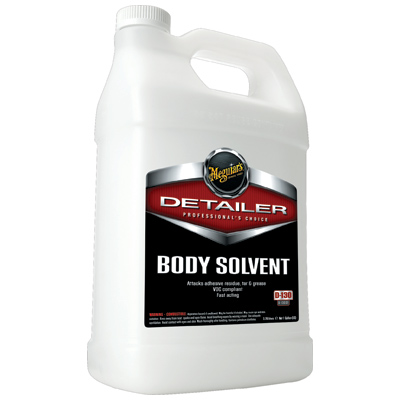DogRescuer
New member
- Apr 6, 2013
- 1,801
- 0
Has anyone ued this on REALLY VERY OLD tar removal and been successful? Please no arguing about its lonng term affects on CC AND paint. We are all entitled to our opinion.
Follow along with the video below to see how to install our site as a web app on your home screen.
Note: This feature may not be available in some browsers.
Is this the Meguiar's solvent you're talking about:Has anyone ued this on REALLY VERY OLD tar removal and been successful?

That would seem to take all of the FUN out of it.Please no arguing about its lonng term affects on CC AND paint. We are all entitled to our opinion.
Even if that were to be true...Isn't megs solvent discontinued?
Even if that were to be true...
That doesn't mean the OP, or other folks don't already own/have some.
-Shoot I've got car-care products that's been discontinued for many a moon now...even decades.
-"Fleabay/Amazonion/Graig's-List"/etc. seem to always have some NOS of something or the other for sale all of the time.
Good question though.
Bob
It may not be the "fastest-working" solvent (YMMV)...The body solvent is one of the few products by megs that really just isn't that great.
Meguiar's Body Solvent (D130)...MUST!...allow me to emphasize that again:
MUST!! dwell on the problem areas before it does it's magic!!
See if your local guy's solvent contains any of the followingI'd like to get my hands on some to try it. I use a solvent made by a local company in my area and really like it.
I always like to try meguiars comparable products to the stuff my local guy makes. Everything he makes is very good,
but meguiars products are generally a bit better, especially when it comes Dow to compounds & polishes.
Thanks you are always helpful. Is that like kerosene?The body solvent is one of the few products by megs that really just isn't that great.
I use dlimonene to remove most tar, grime, decal adhesive, etc.
Thanks sir.It may not be the "fastest-working" solvent (YMMV)...
However as I mentioned earlier:
See if your local guy's solvent contains any of the following
Meguiar's D130 chemicals/ingredients/components:
From Meguiar's D130 MSDS:
Components...........................CAS#..........%
Isoparaffinic Hydrocarbon....64742-47-8....55-65
Isoparaffinic Hydrocarbon....64742-48-9....35-45
Some of: Isoparaffinic Hydrocarbon (CAS# 64742-47-8) synonyms:
-Aliphatic Hydrocarbon
-Dispersol
-Distillate Fuel Oils, Light
-Hydrotreated Light Petroleum Distillates
-Light Petrolium Distillate
-Low Odor Paraffinic Solvent
-Mineral spirts
-Odorless Base Oil
-Petroleum Distillates
Some of: Isoparaffinic Hydrocarbon (CAS# 64742-48-9) synonyms:
-Kerosene (Low Odor)
-Synthetic aliphatic hydrocarbon (hydrotreated)
-Isopar L Solvent
-Naptha
-Hydrotreated heavy naphtha (petroleum)
-Hydrotreated light steam cracked naptha
_______________________________________________________________________________________________
Doesn't it appear that D130 is, basically, just a:
"chemical-lab formulation/mixture"...of Naptha and Mineral Spirits?
Bob
-Although d-Limonene is very toxic to (and bioaccumulation of this substance will occur in): Aquatic-organisms/fish/mammals....Dlimonene is a citrus based solvent. Arguably safer and better for the environment.
I stress arguably, but I definitely feel better using it compared to petroleum based products.
So what's the answer? What tar remover is mild yet effective and won't kill fish?
Megs body solvent is a 60% odorless kerosene 40% naphtha mix.
^^^Perhaps?...(any "mineral spirits"?)^^^
Give or take a bit on the mix percentage.<<<OK
I know that Naphtha is used by many places as a body solvent to prep the paint work.
My buddy who worked at a toyota factory told me they use it before applying decals and emblems.
It's also in a few prep products.
^^^True^^^
From Meguiar's D130 MSDS:
Components...........................CAS#..........%
Isoparaffinic Hydrocarbon....64742-47-8....55-65
Isoparaffinic Hydrocarbon....64742-48-9....35-45
Some of: Isoparaffinic Hydrocarbon (CAS# 64742-47-8) synonyms:
-Aliphatic Hydrocarbon
-Dispersol
-Distillate Fuel Oils, Light
-Hydrotreated Light Petroleum Distillates
-Light Petrolium Distillate
-Low Odor Paraffinic Solvent
-Mineral spirts
-Odorless Base Oil
-Petroleum Distillates
Some of: Isoparaffinic Hydrocarbon (CAS# 64742-48-9) synonyms:
-Kerosene (Low Odor)
-Synthetic aliphatic hydrocarbon (hydrotreated)
-Isopar L Solvent
-Naptha
-Hydrotreated heavy naphtha (petroleum)
-Hydrotreated light steam cracked naptha
_______________________________________________________________________________________________
Doesn't it appear that D130 is, basically, just a:
"chemical-lab formulation/mixture"...of Naptha and Mineral Spirits?